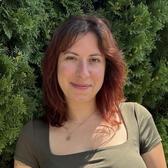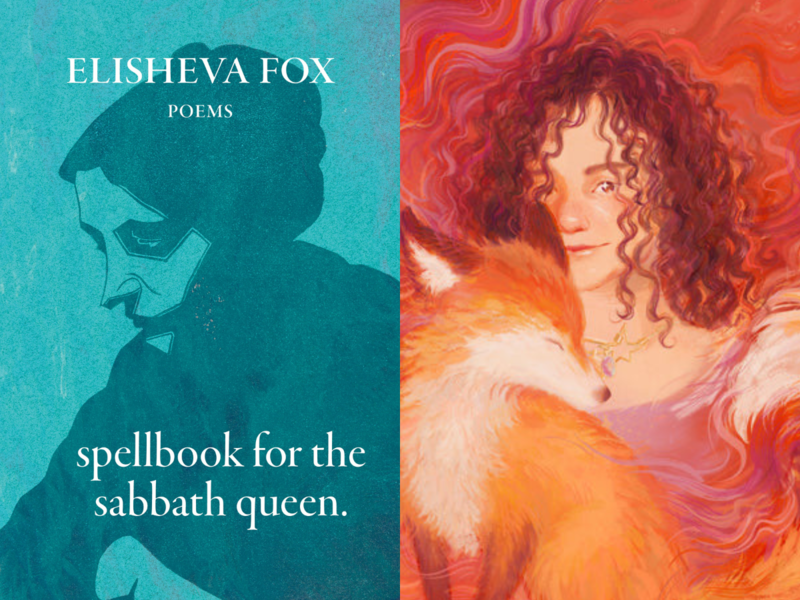7 Questions For Elisheva Fox
JWA sat down with Texas-based poet Elisheva Fox to discuss Spellbook for the Sabbath Queen, her first collection of poems. Her work focuses on themes of queerness, motherhood, and Judaism, and has appeared in Rust + Moth, Paper Brigade, Strange Horizons, and Sand Hills Literary Magazine, among others.
JWA: When did you first become interested in poetry exploring Jewish themes?
Elisheva Fox: My poetry has always been deeply Jewish, as well as deeply Texan. I wasn’t aware of how much Judaism had permeated the ways in which I see the world until I started writing in earnest during COVID, and then I realized it was woven through anything and everything.
JWA: Mysticism is a huge theme throughout Spellbook for the Sabbath Queen. Can you tell us how you chose to weave mysticism into this work?
EF: Jewish mysticism made its way into my pieces unintentionally, but it is absolutely omnipresent. Some of the poems are titled after Tarot cards, which was a deliberate choice. I view Tarot as a framework that reflects our prayer service or liturgy: we repeat prayers, and the meaning that we discover each week changes or shifts depending on what is happening in our lives at any given point. Tarot is no different, and in this way I think it’s a very Jewish tool.
JWA: To me there seems to be a really beautiful connection between the spirituality of mysticism and your discussion of sexual violence and queerness. Did you see a connection between these themes while crafting this collection?
EF: I did not see the connection between these themes while I was actively writing each poem, but it became very clear as I started to work the poems into a cohesive narrative for the book. There is a piece that was recently published in Jewish Book Council’s journal titled “Candles for Artemesia” that connects these themes much more boldly and, frankly, violently. I am very grateful to Jewish Book Council, and specifically Becca Kantor, for taking a chance on my first published piece, “Unsigned,” which addresses some of the passivity in the Jewish community surrounding the objectification of women.
JWA: I would love to know more about your process behind creating Spellbook for the Sabbath Queen. The poems have a clear story arc, which I found really compelling. Did you write them sequentially, or did you organize them later to form the story?
EF: I organized the poems after writing them, but I find it really compelling and personally meaningful that the arc you referenced was so clear from the beginning. The book serves as a reminder, at least to me, that even when growth isn’t obvious on the surface, there will be a spring and wildflowers eventually. This is one of the things I do love and appreciate about our traditions—the cyclical nature of the calendar, the appreciation of seasons of life, the emphasis on both life and memory—all of which reinforce each other and manifest in unexpected ways.
JWA: Wow, that’s really beautiful. You have such a strong sense of story in all of your writing. Even your titles are really stunning and tell a story. They are a mix of Hebrew, English, and references to Kabbalah. What did the process for title selection look like?
EF: After I write a poem, I tend to sit with it for a moment and then let my brain trace out different, seemingly distant connections. It’s a bit like following tributaries from a river. From there I try to craft a title that touches on both the thematic elements of the piece as well as my connections to Judaism and mysticism.
JWA: I think readers really see those two pieces shine through and connect your titles to the larger themes of the collection. Spellbook for the Sabbath Queen unpacks motherhood, queerness, violence, and intimate relationships all through the lens of Jewish experience. These are topics that, especially in observant communities, are often seen as taboo. As an observant Jew, how did it feel to illuminate these heavy topics in your work?
EF: The word to describe the feeling is probably liberating; exhilarating would also be applicable. Part of what I adore about writing under a pen name is that it grants me an absolute freedom to say the things that I want, without fear. These are topics that need to be discussed and brought out into the light. Hanukkah teaches us that even a small light can grow or bloom into something brighter and push back against darkness, hate, or ignorance. Poetry is a venue for lighting fires in the hearts of other people, I think.
JWA: Do you have any new work you are creating?
EF: Right now I am working on a set of poems based on Tehillim [psalms], and I am also trying to draft a modern interpretation of Eshet Chayil. The latter is really challenging, both from a gender and sexuality perspective, as well as a political one. This is also the piece about which I am most excited.
Spellbook for the Sabbath Queen is a JWA 2023-2024 Book Club selection.







